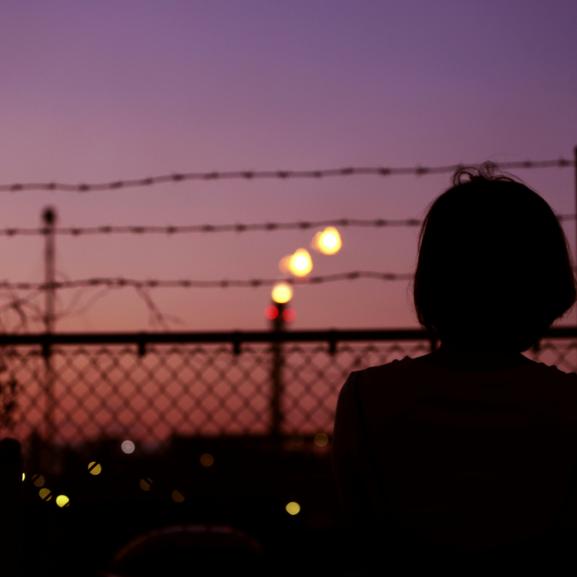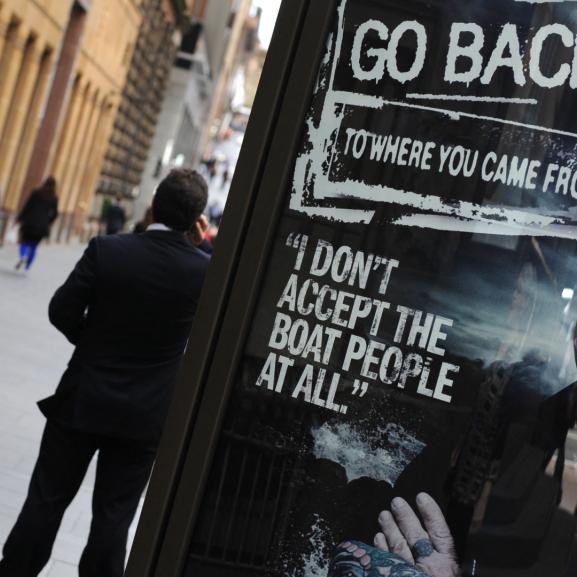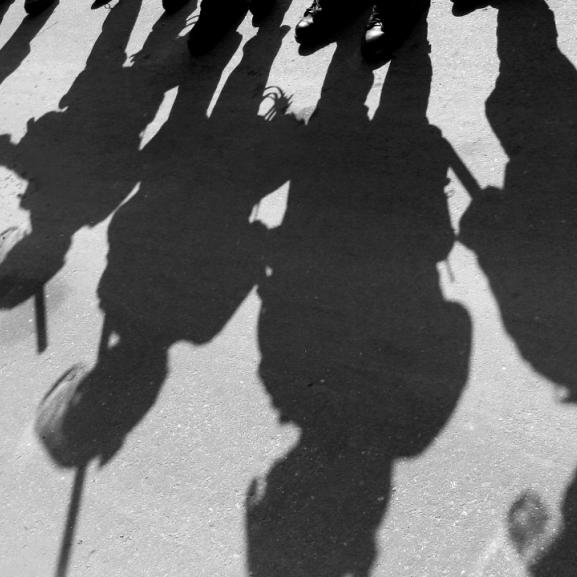Our joint-letter on action to prevent BAME deaths
Freedom from Torture, along with 54 other migration, health and human rights leaders, wrote to the Immigration Minister Chris Philp seeking urgent measures to protect asylum seekers and people in immigration detention from the lethal risks of COVID-19.
Chris Philp MP
Parliamentary Under-Secretary for Immigration Compliance and the Courts
2 Marsham Street
London SW1P 4DF
28 May 2020
Dear Minister,
We write in light of disturbing data from the Office of National Statistics (ONS) showing the disproportionate risk of death for people from Black, Asian and minority ethnic (BAME) backgrounds involving COVID-19, to urge you to take further immediate steps to protect vulnerable BAME people for whom the Home Office is directly responsible.
The COVID-19 pandemic has major implications for people within the immigration system, but we are especially concerned about groups facing a heightened risk of infection due to accommodation and support arrangements provided for by the Home Office itself.
Effective social distancing, let alone self-isolation, is simply not possible for those in immigration detention, shared asylum accommodation or hotel or initial accommodation with shared bedrooms, living and/or dining facilities. Most asylum seekers are banned from working and are provided with around £5 a day to live on, little more than the cost of a bottle of hand sanitiser on the high street. These amounts, which have never been enough to live on, place essential hygiene products out of reach because of competing needs for food and other basic living essentials.
Moreover, the ONS data indicates people who are from BAME backgrounds are significantly more likely than white people to die a COVID-19 related death. Analysis from the Institute for Fiscal Studies (IFS) indicates that after adjusting for age and geography, Bangladeshi hospital fatalities are twice those of the white British group, Pakistani deaths are 2.9 times as high and black African deaths 3.7 times as high.
A high proportion of people in immigration detention and asylum seekers are from BAME backgrounds, and many are from the sub-groups referred to in the IFS data above. The evidence, including from the ONS and IFS, already points to health inequalities as a major determinant of COVID-19-related death for BAME people.
Factors that intersect to create health inequalities for marginalised migrant groups generally include: poverty and poor living conditions which make it difficult for people to maintain a good diet; relative malnutrition including Vitamin D deficiency which reduces health generally and immune system function specifically; mental health problems which impact on self-care including management of chronic health conditions, appetite and diet; high rates of PTSD which directly affects immune system function; and various barriers to accessing healthcare including lack of interpreters, fears of NHS charging, including for pre-existing health conditions, and fears of being reported to the Home Office in line with “hostile environment” policies.
For asylum seekers and people in immigration detention specifically, pre-existing health inequalities combined with the increased risk of COVID-19 infection linked to unsafe accommodation arrangements and inadequate levels of financial support provided by the Home Office constitute a ‘perfect storm’ with potentially lethal consequences.
In her response to the Windrush Lessons Learned Review, published just prior to the lockdown, the Home Secretary expressed her determination to tackle “institutional ignorance and thoughtlessness towards the issue of race” uncovered at the Home Office by the review. In particular, Wendy Williams, author of the review, identified a tendency to misunderstand how racially discriminatory impacts of government policy can occur even without discriminatory intent. She warned that the Home Office “must be alive to the need to take positive steps to ensure that individuals do not experience worse outcomes for reasons connected with their race, or which would be indirectly discriminatory” and encouraged improved engagement with civil society, including to ensure that early warnings are heeded.
Even before publication of the Lessons Learned Review, the Home Office had launched many initiatives to transform its culture and practices in response to learning from the Windrush tragedy. Many of us have publicly welcomed these initiatives and are engaging to support their realisation at every level of the department. It is vitally important that these efforts are not derailed by the COVID-19 crisis, and that lessons from the tragedy are carried through into the COVID-19 response.
The Home Office has already taken some important steps in this crisis to protect vulnerable groups for whom it is responsible. We welcome the release of more than 700 people from immigration detention in connection with the COVID-19 public health emergency. The suspension of reporting requirements and face-to-face asylum interviews and the protection against eviction from Home Office accommodation until the end of June have also helped to reduce the risk of infection.
However, civil society organisations have been calling since the onset of the COVID-19 emergency for more wide-reaching protective action. We consider that the ONS data increases the urgency considerably and that the Home Office has positive obligations under the Human Rights Act (including Articles 2 and 14 of the European Convention on Human Rights read together) and the Equality Act to take further preventative measures.
Thorough equality impact assessments of all the Home Office’s COVID-19 crisis measures are necessary. If this has not happened already, these should be updated expeditiously in light of the ONS findings, with a special focus on BAME people who are seeking asylum or in immigration detention and others within the immigration system, including those without recourse to public funds, who are particularly vulnerable.
In addition, we urge you to take the following immediate protective steps in relation to people in detention and asylum seekers who are at heightened risk of infection for the reasons identified above and heightened risk of harm if they do contract COVID-19:
-
Release all persons detained under immigration powers, provide them with safe accommodation allowing for self-isolation and access to essential services, and provide adequate financial support to all those who need it.
-
An end to enforced bedroom sharing and urgent assessments, in conjunction with public health experts, of the adequacy of all asylum accommodation to ensure it complies with public health requirements and enables effective social distancing and self-isolation.
-
Increase asylum support rates by reinstating the link with mainstream benefits, and with an immediate increase of £20 per week in line with the uplift given at the beginning of the crisis to those on Universal Credit and Working Tax Credit
-
Extend financial support to people who have had their asylum claim or appeal refused and the protection against eviction from asylum accommodation until after the crisis has ended.
-
Suspend NHS charging and data sharing, to ensure that no one is deterred from accessing healthcare during the pandemic.
We look forward to further analysis of underlying drivers of the disparities in COVID-19 risk and outcomes for BAME people, including by Public Health England and the National Institute for Health Research, and support calls for an independent public inquiry into the disproportionate impact on BAME people in particular. However, the evidence to date is stark enough. As called for yesterday by BAME campaigners, it is important that whatever comes from this pandemic, the government reflects on the inequalities and discriminatory policies and practises that have led to a disproportionate number of people from BAME communities dying from this awful disease.
The Home Office should not wait for these more detailed studies before taking further precautionary measures to identify and protect the BAME groups for whom it is directly responsible, including BAME people in immigration detention and asylum seekers. It is essential that the Home Office immediately draws on lessons learnt from the Windrush scandal to monitor and evaluate the direct and indirect impact of policies, regardless of intent, on minority communities across this country, to ensure that every individual is protected. This work would complement the race equality strategy called for by BAME campaigners just yesterday.
The COVID-19 pandemic is affecting everyone in Britain, but it is not affecting us all equally. BAME groups subject to immigration control, including those whose living situations are provided for by the Home Office, are among those facing higher risks of COVID-19 infection, illness and death.
We look forward to hearing from you and working together to mitigate these risks.
Sonya Sceats, CEO, Freedom from Torture
Maurice Wren, CEO, Refugee Council
Sabir Zazai, CEO, Scottish Refugee Council
Stephen Hale, CEO Refugee Action
Dr Zubaida Haque, Interim Director, The Runnymede Trust
Satbir Singh, CEO, Joint Council for the Welfare of Immigrants
Bella Sankey, Director, Detention Action
Martha Spurrier, Director, Liberty
Andy Gregg, Chief Executive, Race on the Agenda
Zita Holbourne, Co-founder & National Chair, BARAC UK
Jabeer Butt, Chief Executive, Race Equality Foundation
Sophie Neuburg, Executive Director, Medact
Kerry Smith, CEO, Helen Bamber Foundation
Sarah Teather, Director, Jesuit Refugee Service
Natasha Walter, Director, Women for Refugee Women
Lucy Jones, Director of Programmes, Doctors of the World UK
Leila Zadeh, Executive Director, UK Lesbian & Gay Immigration Group
Emma Ginn, Director, Medical Justice
Zrinka Bralo, CEO, Migrants Organise
Ali McGinley, Director, Association of Visitors to Immigration Detainees
Sebastian Rocca,Founder and CEO, Micro Rainbow
Deborah Gold, Chief Executive, NAT (National AIDS Trust)
Andrew Evans, Deputy CEO, METRO Charity
Sainga Tony, Development Director, Olmec
Sarah Mann, Director, Friends Families and Travellers
Abi Brunswick, Director, Project 17
Hazel Williams, Director, NACCOM
Sally Daghlian, CEO, Praxis
Scott Cuthbertson, Development Manager, Equality Network
Jeni Hurst, Director of Service Development and Delivery BHA for Equality
Matthew Hodson Executive Director, NAM/aidsmap
Grant Sugden, CEO, Waverley Care
Paul Martin, Chief Executive, LGBT Foundation
Miriam Orcutt, Executive Director, Lancet Migration
Denise McDowell, Chief Executive, Greater Manchester Immigration Aid Unit
Jayne Ozanne, Director, Ozanne Foundation
Michael Collins, Coordinator, Right to Remain
Luljeta Nuzi, CEO, Shpresa Programme
Daf Viney, Director of services, Hackney Migrant Centre
Mel Steel, Director, Voices in Exile
Will Sutcliffe, Chair, Bradford City of Sanctuary
Karen Pearse, Director, PAFRAS
Julian Prior, CEO Action Foundation
Bahiru Shewaye, House of Guramayle
Felix Kupay, Chairperson, ENTRAIDE (Mutual Aid)
Becky Hellewell, Senior Caseworker, St. Augustine’s Centre
Dr Rebecca Farrington, Senior clinical lecturer division of medical education, University of Manchester
Jared Ficklin, Lecturer, Liverpool Law Clinic, University of Liverpool
Mohammed Amjad, Director, Legal Rights Partnership
Maddy Crowther, Co-Executive Director, Waging Peace
Karolina Maroszek, Centre Manager, Haringey Migrant Support Centre
Joanne MacInnes, Director, West London Welcome Centre for Refugees and Migrants
Aderonke Apata, Founder, Manchester Migrant Solidarity







